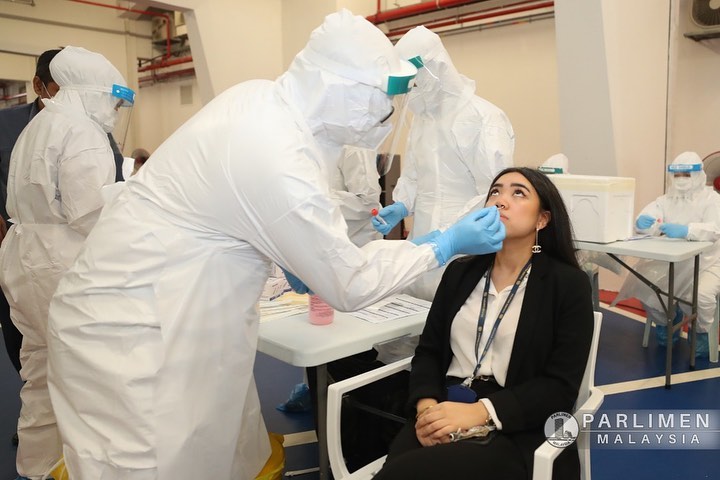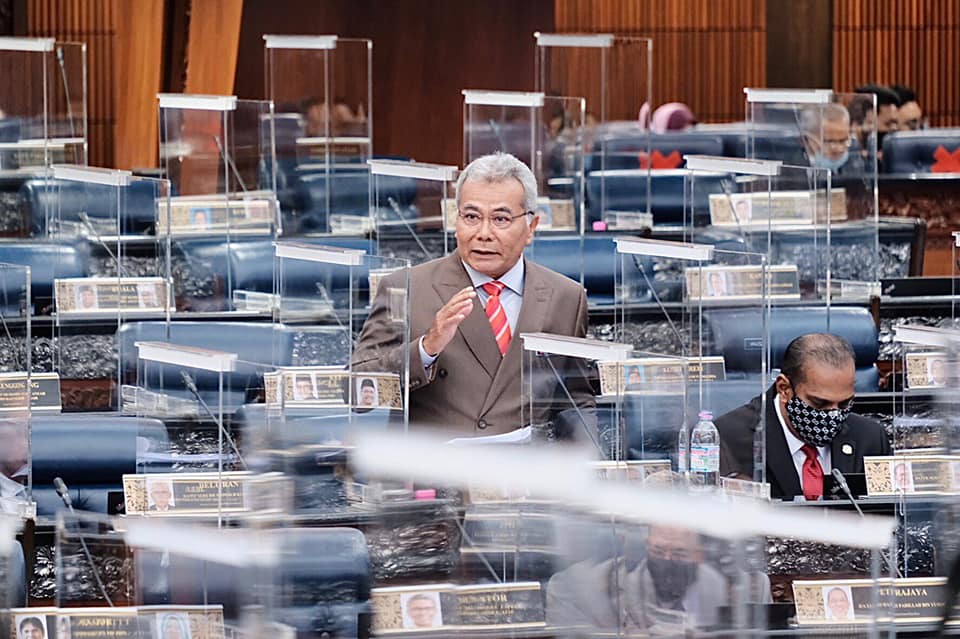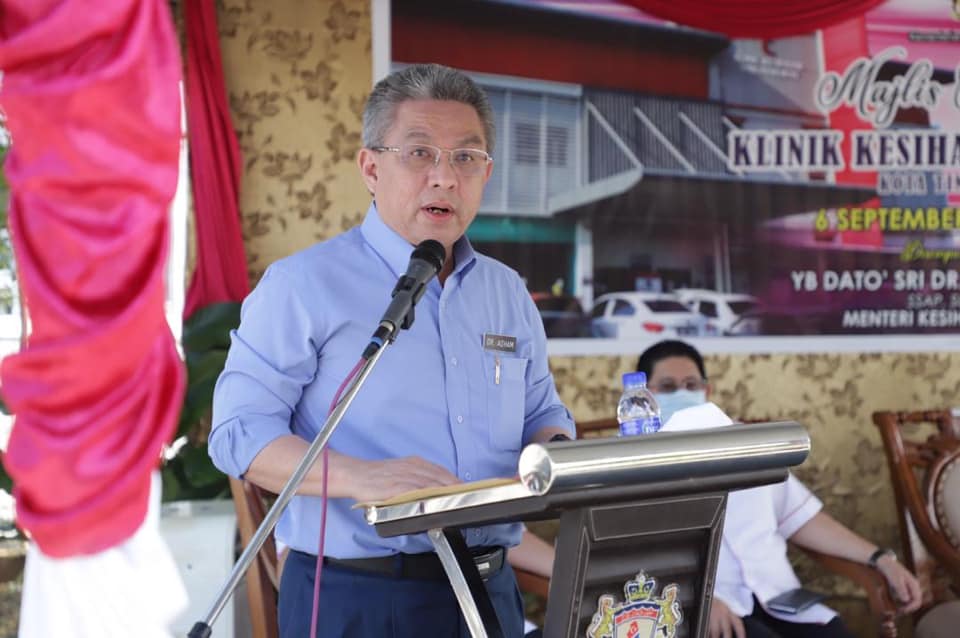KUALA LUMPUR, Dec 4 — Five per cent of the population in targeted enhanced movement control order (TEMCO) areas will be tested for Covid-19, Dr Adham Baba said.
Meanwhile, mass screening for Covid-19 will be done in areas under an enhanced movement control order (EMCO). A TEMCO is typically a smaller geographical area than a place under EMCO.
According to the health minister in his written parliamentary reply on December 3, the increase in the number of tests done for Covid-19 is one of the contributing factors to the rise in the number of coronavirus cases during this third wave.
“The approach used for TEMCO includes screening for Covid-19 that is conducted involving five per cent of the population or locality that is involved. This is an addition to the samples that have been taken while managing the Covid-19 clusters that are happening in that area,” Dr Adham said.
“Taking into account the transmission of active infections that are taking place in that area, this activity indirectly leads to an increase in the recorded cases. Similarly, mass screening involves a locality that is under EMCO orders,” the health minister said.
He was replying to Sungai Siput MP Kesavan Subramaniam, who asked the minister to state the factors that have contributed to the sudden emergence of the third wave of the Covid-19 pandemic.
Dr Adham also said that pandemic fatigue among the people is also one of the contributing factors to the rise in Covid-19 cases. He said that because of the long duration of the Covid-19 pandemic, it’s a natural phenomenon for people to experience pandemic fatigueness.
“Due to this phenomenon, the community is found to be negligent in complying with the standard operating procedures (SOPs), being less aware of the current issues related to this pandemic, and have low levels of risk perception of Covid-19 infection,” the health minister said.
Besides that, Dr Adham said that public gatherings that were held without compliance to standard operating procedures (SOPs) were also one of the factors leading to the rise in the number of Covid-19 cases.
Moreover, he pointed out that the influx in the number of undocumented immigrants has also led to the increase in the number of Covid-19 cases.
“This group brings potential Covid-19 infections from their home country.”
The Benteng LD cluster, which sparked the Covid-19 outbreak in Sabah, was first detected in two undocumented immigrant detainees.
The health minister also said that over-capacity of prisons and detention centres have led to an increase in the clusters involving these facilities in several states, especially in the north of the peninsula and Sabah.
“Thus, various relevant agencies are currently working hard to address this situation, especially to improve the SOPs in the management of prisoners and detainees,” Dr Adham replied to Kesavan.
On November 3, Deputy Home Minister II Jonathan Yasin told the Dewan Rakyat that Malaysian prisons are running at 43.88 per cent more than the actual capacity of jails that can only accommodate 46,420 prisoners. As of November 2, a total of 1,156 prisoners and 83 prison staff and family members got tested with Covid-19 nationwide.
MOH Maintaining Targeted, Not Mass Screening

According to Dr Adham in a different written Dewan Rakyat reply on December 3, the positivity rate of Covid-19 cases detected through normal surveillance is only 0.24 per cent, as compared to targeted screening which has a positivity rate of 3.1 per cent.
Hence, he said that the Ministry of Health (MOH) will be using a targeted screening approach to detect positive cases.
“Taking into account these findings, a targeted screening approach is used, particularly involving close contacts fo Covid-19 cases detected in the field and among individuals who are found to meet the criteria of high-risk groups,” Dr Adham said.
He was replying to Bakri MP Yeo Bee Yin, who asked him to state Malaysia’s total Covid-19 screening capacity, the cost for each test, and the ministry’s efforts in conducting mass testing.
According to Dr Adham, Malaysia’s total testing capacity in 61 labs, including private labs, MOH labs, Ministry of Defence labs, and Ministry of Higher Education labs is 59,485 RT-PCR tests a day.
As of December 2, a total of 2,486,896 RT-PCR tests were conducted and a total of 529,954 antigen rapid tests (RTK-Ag) have been done.
“Until December 2, 2020, the cumulative positive Covid-19 cases in Malaysia is 68,020 people. The total is a part from the total of 2,707,207 individuals that samples were taken in which a positivity rate among those screened is 2.51 per cent,” the health minister said.
Dr Adham did not reveal time-specific positivity rates (percentage of positive cases from the number of people tested), such as the positivity rate in the past two weeks, for example. Someone who tested negative a few months ago can still get infected with the virus later on.
Although Malaysia’s overall positivity rate (from the beginning of the epidemic in January) is below five per cent, it was found that 82 per cent of the country’s total active clusters have a positivity rate above 5 per cent, which simply means more people infected with coronavirus in the community have yet to be tested.
Government Admits Sabah’s State Election Contributed To Third Wave

In a written Dewan Rakyat reply on December 2, Minster from the Prime Minister’s Department in charge of Special Affairs Redzuan Md Yusof said that the Sabah state election in September was one of the factors that led to the third wave of the Covid-19 epidemic in Malaysia.
“It is acknowledged that the Sabah’s state elections is one of the factors that caused the increase, or the occurrence of the third wave of the Covid-19 pandemic in the country, especially in Sabah and coupled with the influx of Covid-19 positive illegal immigrants that worsened the situation,” Redzuan said.
Redzuan was replying to Sri Gading MP Shahruddin Md Salleh, who asked the minister if the general public’s claims that the government had failed to deal with the Covid-19 epidemic caused by the Sabah election was true. The Sabah poll was held on September 26 after a two-week campaign.
Redzuan said that the Sabah election was unavoidable as it was subject to the Federal Constitution that states that elections must be held after the state legislative assembly is dissolved.
However, he said only one-third of the clusters in Selangor were due to infections from Sabah, while two-thirds were from infections within Selangor itself.
In two months from October 1 till December 1 after Sabah’s state elections, Sabah had recorded a total of 27,043 positive Covid-19 cases, which translates to 40.3 per cent of Malaysia’s total Covid-19 cases as of December 2. Moreover, during the same period, Sabah had 214 fatalities from Covid-19.
Five People Prosecuted For Breaking Quarantine Rules, Two Jailed
In another Dewan Rakyat question on December 2, Ipoh Timur MP Wong Kah Woh asked Redzuan for statistics on people who returned from overseas and did not follow compulsory quarantine rules.
Redzuan said that five people who returned from overseas and broke quarantine rules were prosecuted. Three of them were fined RM13,000, while two of them were fined RM20,000 and jailed.
From July 24 till November 15, a total of 52,456 people have entered Malaysia through Kuala Lumpur International Airport (KLIA) and KLIA 2.








